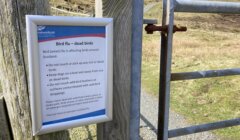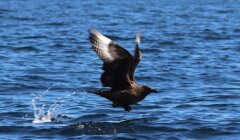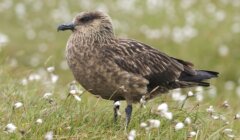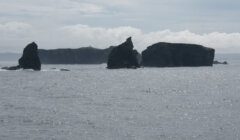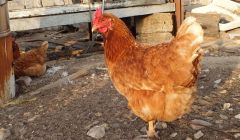Nature / Thousands of birds dying as avian flu runs riot among seabird colonies
Ornithologist ‘extremely worried’ as there is nothing they can do to stop the flu from spreading
AT LEAST 1,000 dead gannets have so far been recorded in the waters around the famous Hermaness sea bird colonies as avian flu runs riot in Shetland’s wild bird populations.
Meanwhile hundreds of great skuas (bonxies) have been found dead or dying mainly in Foula, Fair Isle, the south tip of Shetland and again at Hermaness in what has been described as unprecedented turn of events.
It comes after a case of highly pathogenic avian influenza (H5N1) in poultry was confirmed in Whalsay on Monday with environmental health officers visiting the island today (Tuesday) to help identify other cases.
A protection zone centred on the area in the southwest of the island has been imposed, with a second wider control zone also affecting parts of Shetland’s east mainland.
In the last few weeks four eider ducks, two gulls and a gannet have tested positive for avian flu in Shetland.
Meanwhile, there appears to be little ornithologists can do to limit the spread of the deadly flu among the wild bird population.
With the breeding season in full swing colonies are tightly packed with birds creating ‘super spreader events’ that have wildlife specialists worried about the long-term impact on Shetland’s internationally important seabird populations.
Glen Tyler of Shetland’s NatureScot office said scientists could do little other than “watch this unfold”. There is no treatment and no way to help the birds.
He said there were 50,000 gannets in the Hermaness colony and there were “no signs” of the rate of infection abating.
“We are extremely concerned about the situation and its potential impact on the internationally important seabird populations of these islands,” he said.
“Scotland hosts more than half of the world population of bonxies and just under half of the world’s northern gannet population.
Become a member of Shetland News
“We estimate that an outbreak of avian flu in bonxies last year impacted about 10 per cent of the Shetland population in those sites worst affected. This year, the outbreak appeared earlier in the season and has potential to inflict greater damage to these populations.”
Tyler said because seabirds were long-lived and only became reproductive relatively late in life it would take a very long time to replace populations that will be lost during the current outbreak.
Likely to get worse before the breeding season is over
Photographer and wildlife tour operator Hugh Harrop said the “extremely worrying situation” comes in addition to decades of low productivity among Shetland’s seabirds.
“The main concern, like it or not, are bonxies; we have the highest density of the world’s population in Shetland, it is something that we are internationally famous for, and it is of grave concern that bird flu seems to be rampant within Shetland bonxies in the main colonies of Foula, Fair Isle and Hermaness,” he said.
“What we are seeing now is an amalgamation of bird flu victims. During the non-breeding season birds are spread far and wide. During the breeding season these birds are in close proximity, ultimately big concentration of birds will mean bigger number of bird flu victims.
“If the virus is found to be spread through water course where birds are bathing or coming to drink water than that is potentially catastrophic not only for bathing seabirds but also for our inland birds like red throated divers, red-necked phalaropes and many other species.”
Wildlife tour guide Brydon Thomason added: “It’s absolutely devastating to see such tragedy in our gannetries.
“Locations like Hermaness and Noss which collectively hold over 40,000 breeding pairs are normally places full of such hustle and bustle of life, this year there is so much death.
“We are all hoping that their high population and success as one of our most successful breeding seabirds allows them to bear the brunt of this, which will quite likely get worse before the season is out.”
RSPB Shetland manager Helen Moncrieff said the islands and their wild gull populations were faced with a situation never experienced before.
“I know that folk are feeling quite helpless with this outbreak but something people can do is send in reports of sick and dead birds to [government agency] Defra as this will help our collective understanding and future response to bird flu outbreaks,” she said.
“People should also be vigilant in terms of biosecurity, as set out in biosecurityforlife.org.uk, and please do not disturb breeding birds.
“I’d also advise folk to not encourage gulls to congregate in their gardens from putting out food.”
The risk to human health from avian flu is very low, but members of the public should avoid touching sick or dead wild birds and report any finds directly to Defra on 03459 33 55 77.
More information on the the threat to seabirds can be found in this blog by Paul Watson of the RSPB.
Become a member of Shetland News
Shetland News is asking its many readers to consider paying for membership to get additional features and services: -
- Remove non-local ads;
- Bookmark posts to read later;
- Exclusive curated weekly newsletter;
- Hide membership messages;
- Comments open for discussion.
If you appreciate what we do and feel strongly about impartial local journalism, then please become a member of Shetland News by either making a single payment, or setting up a monthly, quarterly or yearly subscription.



































